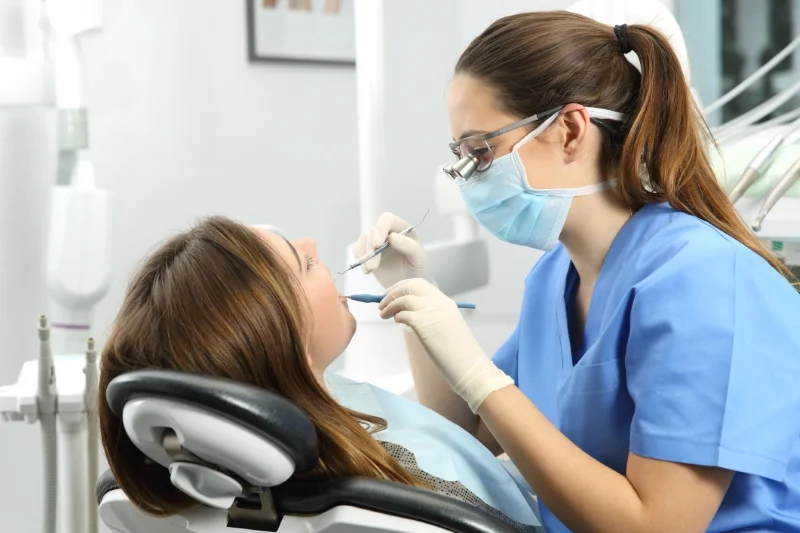We know how important it is to brush our teeth, but did you know that oral hygiene is not just about keeping your mouth clean? Well, it is linked to the general health of an individual. Poor oral care has been associated with serious conditions of heart disease, diabetes, and even conditions affecting the breathing apparatus. The mouth is not just about chewing. It connected the entire body. Here is the reason why proper oral hygiene is crucial.

The Connection Between Oral Health and Overall Health
Oral health isn’t only about not having a cavity or bad breath. It is also about your overall health. These are ways that a healthy mouth can help prevent more critical health issues.
Bacteria and Its Effects
Your mouth is full of bacteria. Some of that is harmless, but some cause trouble. Plaque and tartar are the primary offenders. If one does not brush and floss regularly, this bacteria can be the cause of gum disease. Then gum disease can reach your bloodstream and contribute to a series of other serious health problems including heart disease, strokes, and even Alzheimer’s disease.
Oral Health and Other Health Problems
Several studies have shown that poor oral health can aggravate other diseases. For instance, diabetic patients tend to have gum disease, and when worsens, it gets tough to regulate the sugar levels in the blood. If so, then there would be a vicious cycle from there.
Also, poor oral health causes respiratory problems for the reason that mouth bacteria may travel into your lungs.
Oral Health and Pregnancy
Oral hygiene is crucial during pregnancy. Some studies show pregnant women, who have gum diseases, could be more likely to give birth prematurely and babies with lower-than-normal birth weights. Therefore, “keeping your teeth and gums healthy isn’t just good for you-it’s good for your baby, too.
How Neglecting Oral Hygiene Affects Your Health
Skipping oral care doesn’t just relate to bad breath; it can lead to a complete range of serious health issues. Here’s what might happen if you neglect your teeth and gums.
Plaque and Tartar Build-Up
If it is not removed regularly, plaque becomes tartar which can only be removed by a dentist. Tartar irritates your gums and eventually leads to gum disease. If it advances, it will damage the bones that support your teeth, leading to tooth loss.
Gum Disease
Others include gum disease, which is rather common but preventable. Gingivitis is its initial stage, which makes your gums red, swollen, and bleeding. If left unaddressed, it progresses to periodontitis, in which the infection penetrates the bones and tissues that hold your teeth in place. It can lead to heart disease, diabetes, and even some cancers, so you don’t want to ignore this one.
Cavities and Tooth Decay
Poor oral hygiene also develops cavities. Plaque acids eat away at the enamel of your teeth and give holes that can further develop to decay cavities. If a cavity becomes worse, it can cause extreme pain and lead to infection which may have to be removed or can result in a root canal.
Infections and Complications
An infected tooth that is not treated in time might spread into other parts of the body. Infections in the mouth may lead to dangerous conditions such as sepsis, which can be fatal. Additionally, the bacteria from your mouth can move to other parts of your body and cause diseases such as pneumonia or kidney disease.
Benefits of Good Oral Hygiene
Good oral hygiene isn’t only about the aesthetic appeal of your smile; rather, it’s about avoiding a whole list of health problems. Here’s why it’s important:
Prevent Dental Problems
Keeping plaque and tartar off your teeth by regular brushing and flossing prevents you from experiencing cavities and gum disease. This would ultimately save you a good many painful and costly procedures at the dentist.
Improves General Health
There’s growing evidence that taking care of your teeth can lower your chances of heart disease, diabetes, and even certain cancers. Healthy gums and teeth are associated with better heart health and reduced risk of stroke. The more you look after your mouth, the better you’ll feel overall.
Boosts Mental Health
A healthy smile boosts your confidence. When your teeth and gums are in good shape, you’re less likely to worry about bad breath or feeling self-conscious. Good oral health also contributes to better mental well-being, as you’re less likely to experience stress over dental problems.
Tips for Maintaining Oral Health
Good oral hygiene isn’t complicated, but it does require consistency. Here are some easy-to-follow tips to keep your mouth in top shape:
Brush and Floss Frequent
Brush your teeth at least twice a day with fluoride toothpaste. Be sure to brush for at least two minutes and use a soft-bristled toothbrush to avoid damaging your gums. Don’t forget to floss once a day to get rid of food particles and plaque that your toothbrush can’t reach. Adding an antimicrobial mouthwash to your routine can also help reduce bacteria in your mouth.
Choose the Right Tools
Choose a soft-bristled toothbrush to avoid causing damage to the gums. This should be replaced every three to four months, or sooner if the bristles become worn. Alternatively, electric toothbrushes work very well at removing plaque, so it may be an option to consider too.
Maintain a Healthy Diet
What you eat can affect your teeth and gums. Foods that are strong in calcium, such as milk, and vitamin D, like egg and fish, are good for your teeth. Crunchy fruits and veggies, like apples and carrots, naturally clean your teeth and stimulate your gums. Avoid sugary snacks since sugar feeds bacteria which causes cavities.
Drink Water
This is very basic, yet so important, as it implies proper oral health. Water rinses away food particles and keeps your mouth hydrated. Drink plenty of water throughout the day to help maintain a clean mouth and prevent dry mouth, which can lead to bad breath and tooth decay.
Don’t Harm Your Smile
Smoking and binge drinking can destroy your gums, and may even lead to oral cancer. Avoid many sweet snacks and soft drinks (like soda) which contribute to dental decay.
The Role of Nutrition in Oral Health
Eating the right foods plays just as important a role in your teeth as brushing and flossing. Here’s how nutrition plays a big role in keeping your mouth healthy.
Key Nutrients for Oral Health
Vitamins and minerals are the key to healthy, strong teeth and gums. Calcium helps build enamel, while vitamin D allows your body to absorb calcium properly. Phosphorus, found in protein foods such as meat, beans, and nuts, accompanies calcium in strengthening your teeth.
Best Dietary Foods for Oral Health
As a great source for your mouth, these include leafy greens, dairy products, eggs, and nuts. Crunchy fruits and veggies, like apples and carrots, act as a natural toothbrush and help clean your teeth the more you chew on them. A variety of nutrient-rich foods promote oral health and overall wellness.
Foods to Avoid
Sugary treats, sodas, and acidic foods are likely to cause enamel erosion and problems with cavities. The more limited your intake of sugary goodies, the better for your teeth. Brushing when you do indulge is always good for reducing damage.
Stay Hydrated
One of the simplest ways of ensuring healthy mouths is through drinking enough water. It helps clear away food particles and the bacteria that accompany them from the mouth, preventing plaque and tartar buildup. Being well-hydrated also ensures your saliva flows, thereby serving as the natural protector of your teeth against decay.
The Importance of Regular Dental Check-Ups
No matter how good a brusher and flosser you are, regular visits to the dentist are necessary. Here’s why:
Early Detection of Problems
You might feel no pain at all, but a dentist can identify early warning signs of problems such as cavities, gum disease, or even oral cancer. Early detection makes the treatment easier and less costly.
Professional Cleanings
Even with good daily care, tartar can build up on your teeth, which only a professional can remove. Getting a cleaning every six months ensures your teeth stay in top shape and helps prevent gum disease.
X-Rays and More
Your dentist will use X-rays to detect hidden issues such as cavities between your teeth or bone loss due to gum disease. Since oral cancer, particularly in its early stages, may not be observable to the naked eye, the X-rays can identify it.
Take Charge of Your Health
Oral health is not just about having a good, pretty-looking smile, but it’s more related to taking care of your body. Brushing, flossing, eating the right foods, and seeing the dentist regularly sets up a lifetime of better health. Healthy teeth and gums are the cornerstone for overall well-being, so start today and take charge of your smile!
Stay tuned to inspire4ward for more updates.



